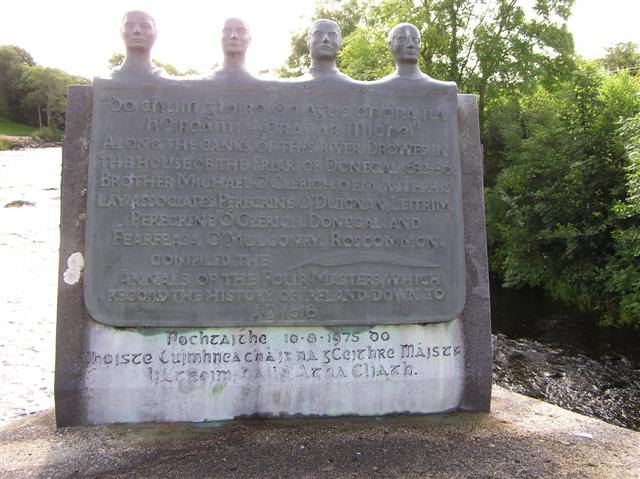|
Cétadach
Cétadach was the 31st Abbot of Clonmacnoise. He died in 848. Cétadach succeeded Rónán, who resigned in 823 but only died in 844. The following events were recorded during his time as abbot: * ''845: There was an encampment of the foreigners under Tuirgéis on Loch Rí, and they plundered Connacht and Mide and burned Cluain moccu Nóis with its oratories, and Cluain Ferta Brénainn, and Tír da glas and Lothea and many monasteries.'' * ''846: The church-lands of Ciarán were plundered by Feidlimid son of Crimthann. Ciarán however followed him to Mumu and gave him a thrust of his crozier for it, so that he was afflicted with an internal wound.'' * ''847: Eógan son of Edacáin son of Torbarg, an anchorite, rested in Cluain moccu Nóis.'' The Annals of the Four Masters The ''Annals of the Kingdom of Ireland'' ( ga, Annála Ríoghachta Éireann) or the ''Annals of the Four Masters'' (''Annála na gCeithre Máistrí'') are chronicles of medieval Irish history. The entri ... [...More Info...] [...Related Items...] OR: [Wikipedia] [Google] [Baidu] |
Abbot Of Clonmacnoise
The Abbot of Clonmacnoise was the monastic head of Clonmacnoise. They also bore the title "Coarb, Comarba of Ciarán of Clonmacnoise, Saint Ciarán", "successor of Saint Ciarán". The following is a list of abbots: List of abbots to 1539 Notes References *Annette Kehnel, ''Clonmacnois the Church and Lands of St. Ciarán:Change and Continuity in an Irish Monastic Foundation (6th- to 16th Century)'', 1995, Transaction Publishers, Rutgers – State University, USA. . * * {{DEFAULTSORT:Abbot of Clonmacnoise Irish abbots, Clonmacnoise Lists of abbots, Clonmacnoise Religion in County Offaly ... [...More Info...] [...Related Items...] OR: [Wikipedia] [Google] [Baidu] |
Annals Of The Four Masters
The ''Annals of the Kingdom of Ireland'' ( ga, Annála Ríoghachta Éireann) or the ''Annals of the Four Masters'' (''Annála na gCeithre Máistrí'') are chronicles of medieval Irish history. The entries span from the Deluge, dated as 2,242 years after creation to AD 1616. Publication delay Due to the criticisms by 17th century Irish historian Tuileagna Ó Maol Chonaire, the text was not published in the lifetimes of any of the participants. Text The annals are mainly a compilation of earlier annals, although there is some original work. They were compiled between 1632 and 1636, allegedly in a cottage beside the ruins of Donegal Abbey, just outside Donegal Town. At this time, however, the Franciscans had a house of refuge by the River Drowes in County Leitrim, just outside Ballyshannon, and it was here, according to others, that the ''Annals'' were compiled. [...More Info...] [...Related Items...] OR: [Wikipedia] [Google] [Baidu] |
9th-century Irish Abbots
The 9th century was a period from 801 ( DCCCI) through 900 ( CM) in accordance with the Julian calendar. The Carolingian Renaissance and the Viking raids occurred within this period. In the Middle East, the House of Wisdom was founded in Abbasid Baghdad, attracting many scholars to the city. The field of algebra was founded by the Muslim polymath al-Khwarizmi. The most famous Islamic Scholar Ahmad ibn Hanbal was tortured and imprisoned by Abbasid official Ahmad ibn Abi Du'ad during the reign of Abbasid caliph al-Mu'tasim and caliph al-Wathiq. In Southeast Asia, the height of the Mataram Kingdom happened in this century, while Burma would see the establishment of the major kingdom of Pagan. Tang China started the century with the effective rule under Emperor Xianzong and ended the century with the Huang Chao rebellions. While the Maya experienced widespread political collapse in the central Maya region, resulting in internecine warfare, the abandonment of cities, and a northward ... [...More Info...] [...Related Items...] OR: [Wikipedia] [Google] [Baidu] |
Christian Clergy From County Galway
Christians () are people who follow or adhere to Christianity, a monotheistic Abrahamic religion based on the life and teachings of Jesus Christ. The words ''Christ'' and ''Christian'' derive from the Koine Greek title ''Christós'' (Χριστός), a translation of the Biblical Hebrew term ''mashiach'' (מָשִׁיחַ) (usually rendered as ''messiah'' in English). While there are diverse interpretations of Christianity which sometimes conflict, they are united in believing that Jesus has a unique significance. The term ''Christian'' used as an adjective is descriptive of anything associated with Christianity or Christian churches, or in a proverbial sense "all that is noble, and good, and Christ-like." It does not have a meaning of 'of Christ' or 'related or pertaining to Christ'. According to a 2011 Pew Research Center survey, there were 2.2 billion Christians around the world in 2010, up from about 600 million in 1910. Today, about 37% of all Christians live in the Amer ... [...More Info...] [...Related Items...] OR: [Wikipedia] [Google] [Baidu] |


